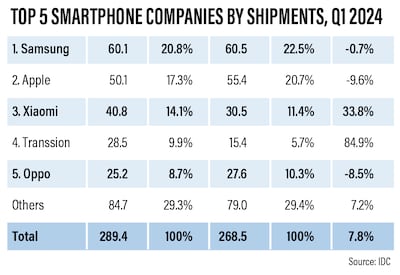Samsung Electronics is the world's top smartphone manufacturer once again, as Apple slipped in the first quarter, the International Data Corporation said.
The South Korean technology company shipped 60.1 million units through the first three months of this year, according to preliminary data from the IDC's latest Worldwide Quarterly Mobile Phone Tracker on Monday. Its market share, however, declined 1.7 percentage points to 20.8 per cent.
Apple, meanwhile, saw its shipments slide 9.6 per cent to 50.1 million units, with market share shedding 3.4 percentage points to 17.3 per cent, the US research firm said.

The iPhone sales have stagnated in recent years, dragged by lower growth in its crucial market of China and an uncertain macroeconomic environment, which, chief executive Tim Cook acknowledged in November.
The company stopped offering guidance at the start of the Covid-19 pandemic in 2020 because of uncertainty in business.
Apple managed to recover with strong iPhone sales in its fiscal fourth and first quarters, helping it overtake Samsung as the world's biggest smartphone manufacturer last year – the first time Samsung had lost the top spot since 2010.
However, Samsung quickly took it back, tapping into the generative artificial intelligence trend in its latest Galaxy S24 smartphones to hold an edge over its biggest rival. Apple is expected to unveil its generative AI plans at its Worldwide Developers Conference in June.
“Samsung successfully reasserted itself … the IDC expects these two companies to maintain their hold on the high end of the market,” Ryan Reith, IDC group vice president, wrote in the report.
Overall, global smartphone shipments rose 7.8 per cent annually to an estimated 289.4 million units in the three months to the end of March, the IDC said.
China's Xiaomi, the long-time third-biggest smartphone manufacturer, maintained its position as its shipments rose by more than a third to 40.8 million units while boosting its market share by about a quarter to 14.1 per cent.
Fellow Chinese brand, Transsion, which is the owner of the Tecno, Infinix and Itel brands, recorded the biggest increase in shipments, which rose about 85 per cent to 28.5 million units to grow its market share by almost three quarters, the IDC said.
Rounding out the top five is Oppo, another China-based brand, which counts OnePlus under its umbrella. Oppo saw its shipments decline 8.5 per cent to 25.2 million units in the first quarter, and its market share down to 8.7 per cent.
Shipments for other brands posted a 7.2 per cent increase to 84.7 million units, with their market share fairly flat.
“While the industry is not completely out of the woods, as macroeconomic challenges remain in many markets, this marks the third consecutive quarter of shipment growth, a strong indicator that a recovery is well under way,” the IDC said.
The smartphone industry has slowed down in the past two years due to several factors, including supply chain issues, high inflation and consumers holding off on upgrading their devices.
However, the upturn is being fuelled by the growth of emerging market economies, a resurgence in consumer spending, an increase in average selling prices and the swift integration of generative artificial intelligence devices.
“The smartphone market is emerging from the turbulence of the last two years both stronger and changed,” said Nabila Popal, research director at the IDC.
Samsung and Apple are expected to maintain their top positions, though the former “is in a stronger position overall than they were in recent quarters”, she said.
Samsung already launched the Galaxy S24 in January and is expected to unveil the newest iterations of its Galaxy Z foldables in July. Apple, meanwhile, is widely anticipated to introduce its next-generation iPhone in September.
While the two industry giants are expected to keep their top spots, Xiaomi, Transsion and Oppo and Vivo, are projected to make a further push, as they look for areas to expand and diversify, the IDC said.
Xiaomi, for instance, has recovered from two years of shipment declines, while Transsion has continued its aggressive growth strategy in international markets, Ms Popal said.
“As the recovery progresses, we're likely to see the top companies gain share as the smaller brands struggle for positioning,” Mr Reith said.

